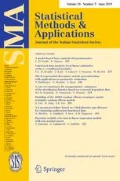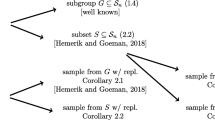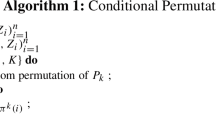Abstract
In this presentation we discuss the extension of permutation conditional inferences to unconditional or population ones. Within the parametric approach this extension is possible when the data set is randomly selected by well-designed sampling procedures on well-defined population distributions, provided that their nuisance parameters have boundely complete statistics in the null hypothesis or are provided with invariant statistics. When these conditions fail, especially if selection-bias procedures are used for data collection processes, in general most of the parametric inferential extensions are wrong or misleading. We will see that, since they are provided with similarity and conditional unbiasedness properties and if correctly applicable, permutation tests may extend, at least in a weak sense, conditional to unconditional inferences.
Similar content being viewed by others
References
Basu D (1978) Relevance of randomization in data analysis. In: Namboodiri NK (ed.) Survey sampling and measurement, pp. 267–292. Academic Press, New York
Berger V. (2000) Pros and cons of permutation tests in clinical trials.Statistics in Medicine 19: 1319–1328
Celant G, Pesarin F (2000) Alcune osservazioni critiche riguardanti l'analisi bayesiana condizionata.Statistica LX: 25–37
Celant G, Pesarin F (2001) Sulla definizione di analisi condizionata.Statistica (to appear)
Cox, DR, Hinkley DV (1974) Theoretical Statistics. Chapman & Hall, London
Frosini BV (1993) Global and conditional tests.Metron 51 (1–2): 27–58
Greenland S (1991) On the logical justification of conditional tests for two-by-two contingency tables.American Statistician 45: 248–251.
Edgington ES (1995) Randomization tests. 3rd edition, Marcel Dekker, New York
Good P (2000) Permutation tests. 2nd edition, Springer, Berlin Heidelberg New York
Kempthorne O (1966) Some aspects of experimental inference.Journal of the American Statistical Association 61: 11–34
Kempthorne O (1977) Why randomize?Journal of Statistical Planning and Inference 1: 1–25
Kempthorne O (1979) Sampling inference, experimental inference and observation inference.Sankhyā 40: 115–145
Kempthorne O (1982) Review of randomization tests by E. S. Edgington.Biometrics 38: 864–867
Lehmann EL (1986) Testing statistical hypotheses. 2nd edition, Wiley, New York
Ludbrook J, Dudley H (1998) Why permutation tests are superior tot andF tests in biomedical research. TheAmerican Statistician 52: 127–132
Mehta CR, Patel NR (1980) A network algorithm for the exact treatment of the 2×K contingency table. Communications in Statistics.Simulation and Computation 9: 649–664
Mehta CR, Patel NR (1983) A network algorithm for performing Fisher's exact test inr×c contingency tables.Journal of the American Statistical Association 78: 427–434
Pagano M, Tritchler D (1983) On obtaining permutation distributions in polynomial time.Journal of the American Statistical Association 78: 435–440
Patil GP, Rao CR (1977) The weighted distributions: a survey of their applications. In: Krishnaiah PR (ed.) Applications of statistics, pp. 383–405, North-Holland, Amsterdam
Pesarin F (2001) Multivariate permutation tests with applications in biostatistics. Wiley, Chichester
Thornett ML (1982) The role of randomization in model-based inference.Australian Journal of Statistics 24: 137–145
Author information
Authors and Affiliations
Rights and permissions
About this article
Cite this article
Pesarin, F. Extending permutation conditional inference to unconditional ones. Statistical Methods & Applications 11, 161–173 (2002). https://doi.org/10.1007/BF02511484
Issue Date:
DOI: https://doi.org/10.1007/BF02511484




